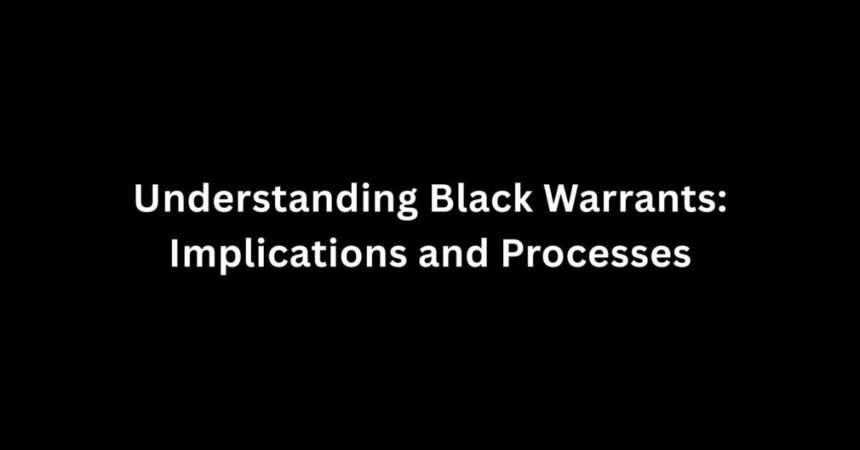In the ever-evolving landscape of law enforcement and criminal justice, the term “Black Warrant” has come to signify a complex process with serious implications. For many, the concept may raise questions about its origins, applications, and the legal intricacies involved. This blog post will dive into the multifaceted nature of Black Warrants, examining their definition, significance, and the processes surrounding their issuance and execution. Whether you’re a legal professional, a student of criminology, or simply a curious reader, this detailed exploration aims to provide clarity on this important subject.
Understanding Black Warrants
A Black Warrant generally refers to a type of arrest warrant issued for an individual, often characterized by its secrecy and urgency. Unlike ordinary arrest warrants, Black Warrants may be used in high-stakes situations where the individual poses a significant threat to public safety or is considered a fugitive.
The Definition and Characteristics of Black Warrants
Black Warrants are distinct from typical arrest warrants in several ways:
- Secrecy: The issuance of a Black Warrant often involves confidential proceedings to prevent the individual from fleeing or destroying evidence.
- Velocity: Due to the nature of the cases that Black Warrants typically involve, law enforcement agencies often act quickly to apprehend the individual.
- High Risk: The targets of Black Warrants are usually individuals who have committed serious offenses or are known to have violent behaviors.
Legal Framework Surrounding Black Warrants
Black Warrants operate within a legal framework that varies by jurisdiction. Generally, law enforcement agencies must meet certain criteria to justify the issuance of such a warrant:
- Probable Cause: The agency must establish probable cause that the individual has committed a crime.
- Secrecy Requirements: Specific protocols must be followed to maintain the confidentiality of the warrant, which can include limiting access to information.
The Process of Issuing a Black Warrant
The process behind a Black Warrant involves several crucial steps, each aimed at ensuring that the warrant is valid, necessary, and executed lawfully.
Gathering Evidence
The first step in the process usually involves collecting robust evidence against the suspect. This can include:
- Witness statements
- Surveillance footage
- Physical evidence
Law enforcement agencies must ensure that this evidence meets the legal standard required for establishing probable cause.
Requesting the Warrant
Once the evidence is gathered, law enforcement officials will petition a judge or magistrate for the issuance of a Black Warrant. Prior to the hearing, they must prepare a detailed affidavit outlining the evidence and reasoning behind the warrant request.
Judicial Review
The judge will conduct a review of the evidence presented. If they are satisfied with the amount of proof indicating probable cause, they will issue the warrant. In some jurisdictions, this can happen quickly, sometimes within hours.
Execution of a Black Warrant
Once the Black Warrant has been issued, the next phase is execution. This stage is crucial, as it involves the actual apprehension of the individual named in the warrant.
Planning the Arrest
Before executing the Black Warrant, law enforcement agencies typically plan the arrest carefully to minimize risk to both officers and the public. Factors they consider include:
- The suspect’s known habits and locations
- Potential threats the suspect may pose
- Timing and approach strategies to ensure officer safety
Surveillance and Coordination
To execute a Black Warrant effectively, law enforcement often employs surveillance tactics and coordinates with various departments. This intelligence-gathering phase can yield significant insights into the suspect’s behavior and current situation.
Challenges and Controversies Involved in Black Warrants
While Black Warrants serve crucial purposes within the justice system, their usage is not without controversy. An examination of challenges faced can shed light on these issues.
Concerns About Abuse of Power
One of the primary concerns surrounding Black Warrants is the potential for abuse of power by law enforcement. Cases involving wrongful arrests may arise, leading to public mistrust. Ensuring accountability and oversight within the process is vital.
Impact on Civil Liberties
The secrecy surrounding Black Warrants can sometimes infringe on individual rights. Some critics argue that the lack of transparency may lead to violations of civil liberties, emphasizing the need for checks and balances in issuing these warrants.
Case Studies on Black Warrants
Understanding Black Warrants can be enriched through real-world examples. Let’s explore a few instances that highlight their practical application.
Case Study 1: High-Profile Fugitive Arrest
In a notable case in 2020, a man wanted for violent crimes was the subject of a Black Warrant. Law enforcement executed the warrant after months of investigation and surveillance. The operation was conducted swiftly, leading to a successful arrest without any civilian injuries.
Case Study 2: Wrongful Arrest Incident
A recent incident involving a Black Warrant showcased the complexities of this process. An individual was wrongfully arrested due to a mismanaged investigation. The case raised questions about the safeguards surrounding warrant issuance, igniting discussions about potential reforms for greater accountability.
Conclusion: Understanding the Importance of Black Warrants
The concept of Black Warrants embodies critical aspects of law enforcement and criminal justice, reflecting the balance between public safety and individual rights. As we’ve explored through definitions, processes, challenges, and real-life case studies, Black Warrants play a vital role in responding to urgent threats.
Understanding the legal framework and operational aspects of Black Warrants is essential for fostering healthy discussions about justice, accountability, and the protection of civil liberties. If you’re interested in exploring this subject further, we encourage you to share your thoughts or experiences in the comments below, and feel free to share this article on your social media platforms.
For more information and updates on law enforcement practices, check out these reputable sources:
